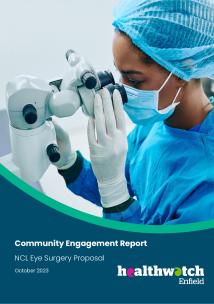Community Engagement: NCL Eye Surgery Proposal 2023

In August 2023, Healthwatch Enfield was commissioned by NHS North Central London Integrated Care Board (NCL ICB) to gather feedback on their proposal to make changes to the configuration of eye (ophthalmology) surgery services. The proposal has the potential to facilitate an additional 3,000 eye surgery procedures annually and significantly reduce waiting times for certain sight-saving surgeries by up to four weeks.
In an effort to understand and address the needs and concerns of those affected by the proposed service changes at the new specialist site in Edgware.
Who took part?
We sent out surveys and held focus groups to collects insights on the planned service changes.
From 4 September – 16 October 2023 we reached out to:
- Engaged with 107 people, of which 85 people took part in our survey on the NCL Eye Surgery Proposal.
- 7.421 people were reached through digital platforms, including Facebook, Twitter, Instagram and the Healthwatch Enfield Website.
- Through community newsletters, we reached out to 14,770 people.
“If you don’t drive, then you rely on people.”
“I can't drive and don't have the funds to travel.”
“Some rely on kids, but they don’t always have the time.”
Key findings
Travel and Transport
- Travelling to the new specialist site poses a range of challenges for participants. Issues include financial burdens, distance of the journey, and time to travel and wait.
- The cost of travelling to Edgware, such as the significant expense of cab fares, presents a substantial financial challenge for many participants.
- The physical distance to Edgware, combined with the potential for delays or cancellations in transport, creates difficulties for patients. This issue is further compounded for those with disabilities, impairments, lack support network, or older age - especially when travelling without a chaperone.
Accessibility
- Participants expressed a strong preference for visual aids like maps and clear directions integrated into standard communication such as appointment letters, to assist with navigation to and within the facility.
- This includes a desire for signage with larger fonts to accommodate a broader range of patients, including the elderly and visually impaired.
- There is a preference for facilities designed on a single level indicates concerns about mobility and the potential challenges of navigating multi-story buildings, especially for the elderly or those with disabilities.
- The implementation of feature such as a green guiding line for easier navigation to and within the facility has been suggested.
Communication
- Participants highlight the necessity for improved understanding about their options in selecting healthcare providers, the importance of receiving detailed information before appointments, and their diverse preferences in communication methods and feedback provision.
- Many respondents were unaware of their ability to choose their preferred NHS trust or hospital upon GP referral, and they desire more agency in selecting appointment times and locations.
- The need for timely, accurate, and clear information about appointments is emphasised, with a particular focus on accommodating different communication needs such as phone calls, letters, or text messages for different groups like the elderly or visually impaired.
- Participants reported long waiting times, both in receiving referrals and on the day of the appointment.
- Patients for whom English is not a first language (ESOL), expressed concerns about potential challenges with language barriers, emphasising the need for clear and easily understandable information.
Support for Vulnerable Patients
- Participants expressed concerns about the mental and physical strains on relying on family members or caregivers, and the challenges faced in navigating the healthcare system, particularly when journeying to new unfamiliar places.
- Elderly individuals and people with disabilities face considerable difficulties, especially when attending appointments alone, which highlights a lack of support for these demographics.
- The challenge is amplified for those unable to bring a companion, making the journey to the facility a stressful experience.
- Many participants experience significant anxiety about travelling to Edgware, especially due to the disruption of their routines or medication timings, a concern that extends to those with specific needs.
- The stress of returning home after treatments or procedures, coupled with frustration over long hospital waiting times, highlights the need for improved patient care coordination and time management.
Staff Training
- Participants seldom touched on the topic of staff training. There was a general assumption of expectation, that the team at the new specialist ophthalmology hub would be trained and well-equipped.
The insights gathered from the engagement highlights challenges and preferences of participants regarding the new specialist site in Edgware.
Central concerns include the financial and logistical difficulties of travel, the need for enhanced accessibility features within the new specialist site at Edgeware Hospital, and the importance of clear and diverse communication methods. The findings also emphasise the necessity for better support for vulnerable patients, including elderly, people with disabilities, ESOL persons, and those who lack support networks.

